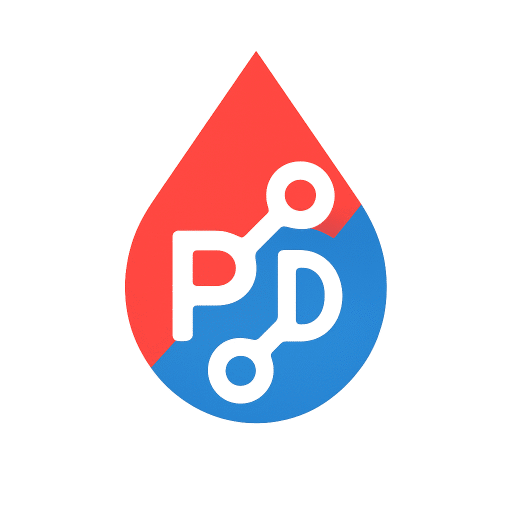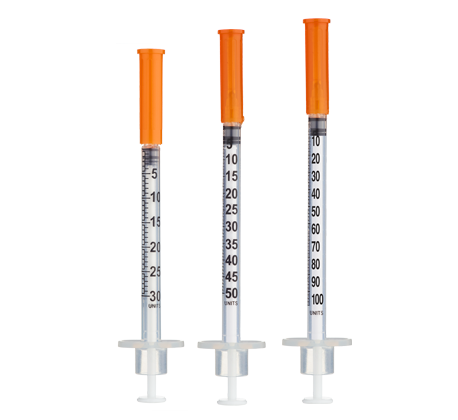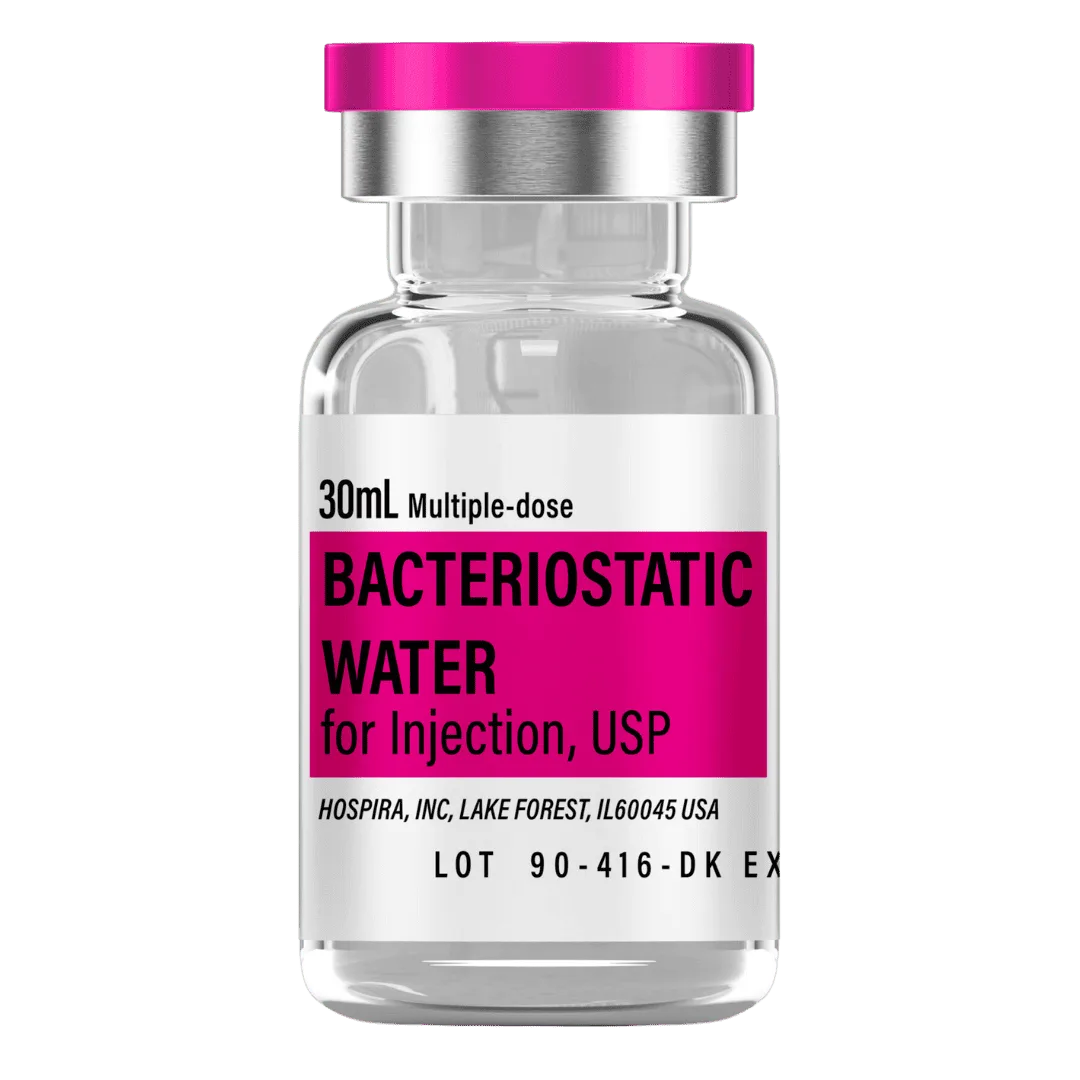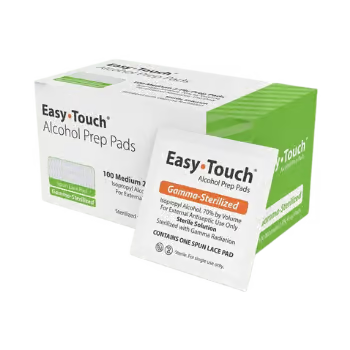CJC-1295 DAC (2 mg Vial) Dosage Protocol
Quickstart Highlights
CJC-1295 DAC dosage protocols leverage this long-acting growth hormone-releasing hormone (GHRH) analog’s unique albumin-binding technology, which extends its half-life to approximately 6–8 days[1][2]. By stimulating pulsatile growth hormone (GH) release while preserving natural GH rhythms, CJC-1295 DAC can elevate GH levels 2–10 fold and IGF-1 levels 1.5–3 fold in human studies[3]. Benefits may include enhanced muscle growth and recovery, improved fat metabolism, better sleep quality, and anti-aging effects through sustained GH/IGF-1 axis activation[4][5]. This educational protocol presents a once-weekly subcutaneous approach using a practical dilution for clear insulin-syringe measurements.
- Reconstitute: Add 1.0 mL bacteriostatic water → 2.0 mg/mL (2,000 mcg/mL) concentration.
- Typical weekly dose: 2,000 mcg (2 mg) once weekly — the full vial per injection.
- Easy measuring: At 2.0 mg/mL, 1 unit = 0.01 mL = 20 mcg on a U-100 insulin syringe; full dose = 100 units (1.00 mL).
- Storage: Lyophilized: freeze at −20 °C (−4 °F); after reconstitution, refrigerate at 2–8 °C (35.6–46.4 °F); avoid freeze–thaw cycles.

Dosing & Reconstitution Guide
Educational guide for reconstitution and weekly dosing
Standard Weekly Approach (1 mL = 2.0 mg/mL)
| Week | Weekly Dose (mcg) | Units (per injection) (mL) |
|---|---|---|
| Weeks 1–12 | 2,000 mcg (2 mg) | 100 units (1.00 mL) |
Frequency: Inject once weekly subcutaneously, preferably in the evening before bed to align with natural nocturnal GH surges[6]. The peptide’s extended half-life (~6–8 days) supports weekly administration without significant loss of activity between doses[1].
Reconstitution Steps
- Draw 1.0 mL bacteriostatic water with a sterile syringe.
- Inject slowly down the vial wall; avoid foaming or direct stream onto the powder.
- Gently swirl/roll until dissolved (do not shake vigorously).
- Label with reconstitution date and refrigerate at 2–8 °C (35.6–46.4 °F), protected from light.
Supplies Needed
Plan based on an 8–12 week weekly protocol.
-
Peptide Vials (CJC-1295 DAC, 2 mg each):
- 8 weeks: 8 vials (1 vial/week)
- 12 weeks: 12 vials (1 vial/week)
-
Insulin Syringes (U-100, 1 mL capacity):
- Per week: 1 syringe
- 8 weeks: 8 syringes
- 12 weeks: 12 syringes
-
Bacteriostatic Water (10 mL bottles): Use 1.0 mL per vial for reconstitution.
- 8 weeks (8 vials): 8 mL → 1 × 10 mL bottle
- 12 weeks (12 vials): 12 mL → 2 × 10 mL bottles
-
Alcohol Swabs: One for the vial stopper + one for the injection site each week.
- Per week: 2 swabs
- 8 weeks: 16 swabs → recommend 1 × 100-count box
- 12 weeks: 24 swabs → recommend 1 × 100-count box
Protocol Overview
Concise summary of the once-weekly regimen.
- Goal: Elevate endogenous GH and IGF-1 levels to support muscle growth, fat metabolism, recovery, and anti-aging research[4][5].
- Schedule: Weekly subcutaneous injections for 8–12 weeks.
- Dose: 2,000 mcg (2 mg) once weekly — one full vial per injection.
- Reconstitution: 1.0 mL per 2 mg vial (2.0 mg/mL) for accurate unit measurements.
- Storage: Lyophilized frozen; reconstituted refrigerated; avoid repeated freeze–thaw.
Dosing Protocol
Suggested weekly administration approach.
- Standard Dose: 2,000 mcg (2 mg) once weekly[7].
- Conservative Option: 1,000 mcg (1 mg) weekly if exploring lower doses.
- Frequency: Once per week (subcutaneous).
- Cycle Length: 8–12 weeks; optional 4-week break between cycles.
- Timing: Evening administration (pre-bed) may synergize with natural nocturnal GH release; rotate injection sites weekly[6].
Storage Instructions
Proper storage preserves peptide quality and efficacy.
- Lyophilized: Store at −20 °C (−4 °F) in dry, dark conditions; minimize moisture exposure.
- Reconstituted: Refrigerate at 2–8 °C (35.6–46.4 °F); use within 4 weeks and avoid freeze–thaw[8].
- Allow vials to reach room temperature before opening to reduce condensation uptake.
Important Notes
Practical considerations for consistency and safety.
- Use new sterile insulin syringes for each injection; dispose in a sharps container[9].
- Rotate injection sites weekly (abdomen, thighs, upper arms) to reduce local irritation[10].
- Inject on an empty stomach (at least 2 hours after a meal) as elevated blood sugar may blunt GH release.
- Document weekly dose, date, and site rotation to maintain consistency.
How This Works
CJC-1295 DAC is a modified 30-amino-acid GHRH analog conjugated to a Drug Affinity Complex (DAC) that covalently binds to serum albumin after injection[1]. This albumin binding dramatically extends the peptide’s half-life from minutes to approximately 6–8 days, enabling once-weekly dosing[2]. CJC-1295 binds to GHRH receptors on pituitary somatotrope cells, amplifying GH synthesis and pulsatile release. Importantly, it elevates basal GH levels while preserving the natural rhythm of GH pulses — the frequency and amplitude remain intact[11]. Clinical trials demonstrate sustained 2–10 fold increases in GH and 1.5–3 fold increases in IGF-1, with elevated IGF-1 persisting for up to 28 days after multiple doses[3].
Potential Benefits & Side Effects
Observations from preclinical and clinical literature.
- Sustained elevation of GH and IGF-1 levels supporting muscle growth, recovery, and lean body composition[4][5].
- Enhanced fat metabolism and potential reduction in visceral adiposity[12].
- Improved sleep quality — GHRH analogs may have somnogenic effects, increasing deep slow-wave sleep[6].
- Preserves natural GH pulsatility unlike exogenous GH administration[11].
- Common side effects may include transient flushing, injection-site reactions, water retention, or headache; serious adverse effects are uncommon at standard doses[7].
Lifestyle Factors
Complementary strategies for best outcomes.
- Pair with a balanced, protein-forward diet tailored to energy and recovery needs.
- Combine resistance training and aerobic activity to reinforce anabolic and metabolic adaptations.
- Prioritize sleep quality — GH is primarily secreted during slow-wave sleep[6].
- Avoid eating 2+ hours before injection to optimize GH release response.
Injection Technique
General subcutaneous guidance from clinical best-practice resources[9][10].
- Clean the vial stopper and skin with alcohol; allow to dry completely.
- Pinch about an inch of skin at the injection site (lower abdomen, outer thigh, or upper arm)[10].
- Insert the needle at a 90° angle into the pinched fold (use 45° if minimal subcutaneous fat)[10].
- Depress the plunger fully, then withdraw the needle and dispose in a sharps container.
- Rotate sites weekly to prevent lipohypertrophy — for example, alternate between left and right abdomen[10].
Recommended Source
We recommend Pure Lab Peptides for high-purity CJC-1295 DAC (2 mg).
Why Pure Lab Peptides?
- High-purity, third-party-tested lots with batch COAs.
- Consistent, ISO-aligned handling and documentation.
- Reliable fulfillment to maintain cold-chain integrity.
Important Note
This content is for educational purposes only and is not medical advice.
References
-
Journal of Clinical Endocrinology & Metabolism
— Prolonged stimulation of GH and IGF-1 secretion by CJC-1295 in healthy adults -
Clinical Pharmacology & Therapeutics
— DAC technology: albumin-binding for extended peptide half-life -
Journal of Clinical Endocrinology & Metabolism
— Single and multiple dose pharmacokinetics of CJC-1295 in healthy subjects -
Growth Hormone & IGF Research (ScienceDirect)
— Activation of the GH/IGF-1 axis by CJC-1295 and serum protein profile changes -
PubMed
— Body composition and quality of life in adults with GH deficiency; effects of GH replacement -
PubMed
— Physiology of growth hormone secretion during sleep -
Journal of Clinical Endocrinology & Metabolism
— Safety and tolerability of CJC-1295 at various dose levels in healthy subjects -
Bachem
— Handling and storage guidelines for peptides -
CDC
— Preventing unsafe injection practices and clinical safety guidelines -
MedlinePlus
— Subcutaneous (SQ) injections: technique, site selection, and rotation -
Endocrine Reviews
— GHRH analogs and preservation of pulsatile GH secretion patterns -
PubMed
— Effect of tesamorelin on visceral fat in HIV-infected patients: randomized clinical trial -
NIBSC
— Peptide storage recommendations and stability guidelines -
Pure Lab Peptides
— CJC-1295 DAC (2 mg) product page (quality and batch documentation)



